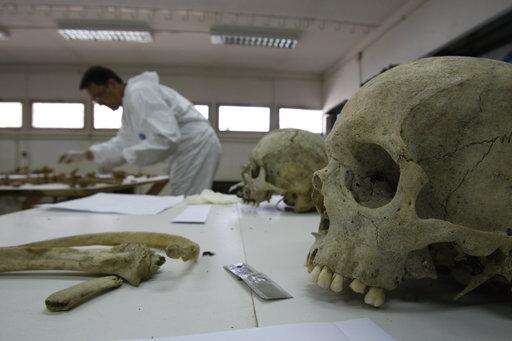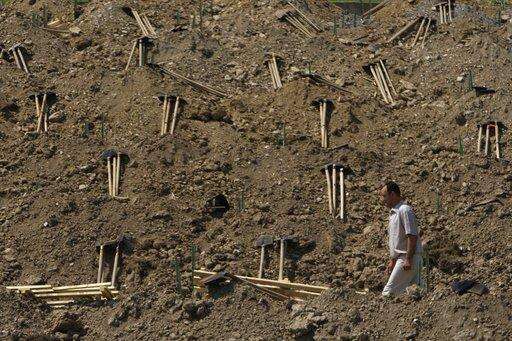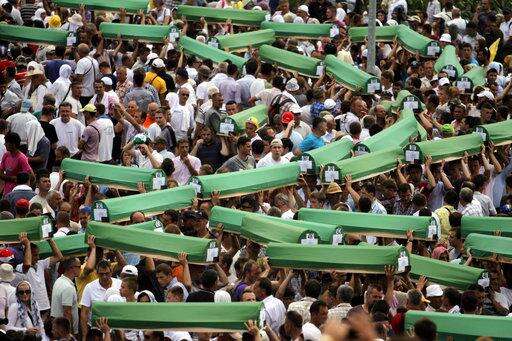FILE - In this April 9, 1994 file photo, former Bosnian Serb commander Ratko Mladic, right, leaves the UN headquarters at Sarajevo airport after talks with the UN General, Sir Michael Rose and Bosnian Commander Rasim Delic. Ratko Mladic will learn his fate on Nov. 22, 2017, when U.N. judges deliver verdicts in his genocide and war crimes trial. (AP Photo/Enric Marti, File)
The Associated Press
BELGRADE, Serbia (AP) - As the U.N. war crimes court prepares to wrap up its work with a verdict in the landmark genocide trial of former Bosnian Serb military chief Ratko Mladic, deep divisions persist in the Balkans over the tribunal's role in delivering justice and paving the way for reconciliation in the war-torn region of Europe.
Mladic's trial is the last major case for the Netherlands-based tribunal for former Yugoslavia, which was set up in 1993 to prosecute those most responsible for the worst carnage in Europe since World War II. The tribunal declared its aim is to "deter future crimes and render justice to thousands of victims and their families, thus contributing to a lasting peace in the former Yugoslavia."
More than 20 years on, however, the nations in the region are still led by nationalist politicians and remain divided deeply along ethnic lines.
Known as the "Butcher of Bosnia," Mladic was charged with 11 counts of genocide and war crimes for the war's worst atrocities, including the 1995 slaughter by his troops of some 8,000 Muslim men and boys in Srebrenica, or the three-year siege of the Bosnian capital Sarajevo.
While widely seen as a symbol of Bosnian war horrors, Mladic is still revered as a hero by many Serbs. In his native Bosnian village of Bozinovici, the main street is named after Mladic and almost every house cherishes at least one photo of him. T-shirts with his wartime portrait and inscription "Serbian Hero" are sold on the streets of Serbian towns.
The 75-year-old former general, who insists he is innocent, faces a maximum life sentence if convicted.
Unlike Serbs, most Muslim Bosniaks in Bosnia believe Mladic deserves to spend the rest of his days in prison. Among them is Ramiza Burzic, who lost her two sons in the Srebrenica massacre and so far has found just partial remains of one of them.
"I expect that he will be sentenced to life in prison, so that all his progeny will know what kind of a man he was and what he did," said Burzic.
This ethnic divide is also reflected in how various ethnic groups judge the tribunal's legacy - Serbs, who account for the bulk of the tribunal indictments, view the court as highly biased, while the other ethnic groups in the former Yugoslavia generally harbor a more positive stance.
"I don't think the tribunal has helped reconciliation, but rather has contributed to further worsening of the situation," Serbia's Prime Minister Ana Brnabic said recently. "No one can say that the Hague tribunal has been objective toward all sides in the conflict of the 1990s."
Chief U.N. War Crimes Prosecutor Serge Brammertz said in an interview with The Associated Press in The Netherlands that "every time a judgment is coming out in The Hague, one group will be very pleased and the other one very unhappy."
"Those reactions show much more that the underlying reasons of the conflict are still very much there," Brammertz said. "So I don't think that accountability - that a judicial process in itself - can lead to reconciliation. Reconciliation has to come from within society, has to come from the victims and perpetrators' community."
"You need a very active civil society looking for the truth and you need politicians who are willing to accept the wrongdoings of the past in order to have a joint future," he said. "This is unfortunately not really happening in the region."
The long-awaited Mladic verdict is seen as a milestone in the efforts to bring the main actors to justice. The tribunal failed to reach a final ruling in the case of Slobodan Milosevic, the former Serbian president widely regarded as the driving force behind the violent breakup of Yugoslavia, who died in his prison cell in 2006 before the end of his trial.
However, the court has so far indicted 161 people of different Balkan nationalities and sent dozens of war criminals to jail - ranging from top leaders to low-ranking soldiers. It has established evidence of large-scale atrocities against civilians such as murder, enslavement, expulsion, torture or rape.
"The tribunal has done tremendously important work on our behalf to dent the notion of impunity for mass atrocities in our social and political discourse," said transitional justice expert Refik Hodzic from Bosnia. "We were lucky to see this institution come to life when it did."
Experts also argue that the tribunal is primarily a legal institution that was never expected to reconcile the feuding Balkan nations, but to establish the facts based on evidence which could help future reconciliation.
Vladimir Vukcevic, Serbia's former chief war crimes prosecutor who helped arrest Mladic in 2011 after he went into hiding more than 10 years earlier, says that "the tribunal's greatest achievement was that it brought a lot of people in top positions to justice."
But, Vukcevic, said: "We are still at the level where each nation is sticking to its own truth. As long as this is so, there is no reconciliation."
The conflict in the former Yugoslavia erupted after the breakup of the former multi-ethnic federation in the early 1990s, with the worst crimes taking place in Bosnia. More than 100,000 people died and millions lost their homes before a peace agreement was signed in 1995.
Prominent Serbian human rights expert Natasa Kandic agrees that "people had unrealistic expectations" the tribunal would do the job of building trust among the countries and societies of the region.
"Decades will need to pass for trust to be established between the different (Balkan) nations," Kandic said. "No court can do that."
____
Sabina Niksic in Sarajevo, Bosnia-Herzegovina. Dusan Stojanovic in Belgrade, Serbia; and Mike Corder in The Hague, Netherlands, contributed to this story.
Exterior view of the Yugoslav War Crimes Tribunal, ICTY, in The Hague, Netherlands, Monday, Nov. 20, 2017, where the court is scheduled to deliver its verdicts in the genocide trial of former Bosnian Serb military chief Ratko Mladic on Wednesday Nov. 22, 2017. (AP Photo/Peter Dejong)
The Associated Press
FILE - In this July 12, 1995 photo, Bosnian Serb army Commander General Ratko Mladic, left, drinks toast with Dutch U.N Commander Tom Karremans, second right, while others unidentified look on in village of Potocari, some 5 kilometers (3 miles) north of Srebrenica. Ratko Mladic will learn his fate on Nov. 22, 2017, when U.N. judges deliver verdicts in his genocide and war crimes trial. (AP Photo)
The Associated Press
FILE - A July 14, 1995 file photo shows refugees from the overrun U.N. safe haven enclave of Srebrenica who had spent the night outdoors, gathering outside the U.N. base at Tuzla airport. Former Bosnian Serb Army chief Ratko Mladic will learn his fate on Nov. 22, 2017, when U.N. judges deliver verdicts in his genocide and war crimes trial. (AP Photo/Darko Bandic, File)
The Associated Press
FILE - In this July 14, 1995 file photo, refugee Ferida Osmanovic from Srebrenica is found hanged in a forest outside the U.N. base at Tuzla airport in Tuzla, Bosnia and Herzegovina. Former Bosnian Serb Army chief Ratko Mladic will learn his fate on Nov. 22, 2017, when U.N. judges deliver verdicts in his genocide and war crimes trial. (AP Photo/Darko Bandic, File)
The Associated Press
FILE - A July, 10, 2007 file photo shows a Bosnian worker passing by a human skull during exhumation at a mass grave site in a village of Budak, near Srebrenica, Bosnia-Herzegovina. Former Bosnian Serb Army chief Ratko Mladic will learn his fate on Nov. 22, 2017, when U.N. judges deliver verdicts in his genocide and war crimes trial. (AP Photo/Amel Emric, File)
The Associated Press
FILE - A Sept. 18, 1996 file photo shows International War Crimes Tribunal investigators clearing away soil and debris from dozens of Srebrenica victims buried in a mass grave near the village of Pilica, some 55 kms (32 miles) north east of Tuzla, Bosnia-Herzegovina. Former Bosnian Serb Army chief Ratko Mladic will learn his fate on Nov. 22, 2017, when U.N. judges deliver verdicts in his genocide and war crimes trial. (AP Photo/Staton R. Winter, File)
The Associated Press
FILE - In this Sunday, Feb. 4, 1996 file photo, skeletal remains of victims of the 1995 massacre at Srebrenica lie on a hilltop just west of Srebrenica, Bosnia-Herzegovina. Former Bosnian Serb Army chief Ratko Mladic will learn his fate on Nov. 22, 2017, when U.N. judges deliver verdicts in his genocide and war crimes trial.(AP Photo/Alexander Zemlianichenko, File)
The Associated Press
FILE - In this July 10, 2007 file photo, Bosnian Muslim men mourn over coffins of Srebrenica victims displayed at the Memorial center in Potocari near Srebrenica, Bosnia-Herzegovina. 465 bodies were excavated from mass-graves in Eastern Bosnia and were identified as Muslims killed by Bosnian-Serb forces in the Srebrenica area. Former Bosnian Serb Army chief Ratko Mladic will learn his fate on Nov. 22, 2017, when U.N. judges deliver verdicts in his genocide and war crimes trial. (AP Photo/Amel Emric, File)
The Associated Press

FILE - A Thursday April 1, 2010 file photo shows Bosnian pathologist Vedo Tuco inspecting remains of victims during the process to re-associate body remains, at the Tuzla identification center for victims exhumed from mass graves, in the northern Bosnian town of Tuzla. Former Bosnian Serb Army chief Ratko Mladic will learn his fate on Nov. 22, 2017, when U.N. judges deliver verdicts in his genocide and war crimes trial. (AP Photo/Amel Emric, File)
The Associated Press

FILE - A July 10, 2011 file photo shows a Bosnian man walking past shovels prepared near graves at the Potocari memorial cemetery near Srebrenica, Bosnia. A burial ceremony for hundreds of victims was on Monday, July 11, 2011 in Potocari, on the 16th anniversary of the Srebrenica tragedy when in 1995 Bosnian Serb forces stormed the enclave and systematically killed thousands of Bosnian Muslims. Former Bosnian Serb Army chief Ratko Mladic will learn his fate on Nov. 22, 2017, when U.N. judges deliver verdicts in his genocide and war crimes trial. (AP Photo/Amel Emric, File)
The Associated Press

FILE - A July 11, 2011 file photo shows people carrying coffins prior to a mass burial at the Potocari memorial cemetery near Srebrenica, Bosnia and Herzegovina. Thousands gathered in Potocari Memorial Cemetery for mass burial of 613 bodies, marking 16th anniversary of Srebrenica massacre. Former Bosnian Serb Army chief Ratko Mladic will learn his fate on Nov. 22, 2017, when U.N. judges deliver verdicts in his genocide and war crimes trial. (AP Photo/Marko Drobnjakovic, File)
The Associated Press
FILE - In this July 9, 2012 file photo, Bosnian Muslim women pray near the coffin of a relative, one of 520 newly identified Srebrenica victims, at the Potocari memorial cemetery near Srebrenica, some 160 kilometers east of Sarajevo, Bosnia and Herzegovina. Former Bosnian Serb Army chief Ratko Mladic will learn his fate on Nov. 22, 2017, when U.N. judges deliver verdicts in his genocide and war crimes trial. (AP Photo/Amel Emric, File)
The Associated Press
FILE - A Tuesday, Oct. 26, 2010 file photo shows a woman walking past a mural depicting Bosnian Serb army commander Ratko Mladic, in Belgrade, Serbia. Former Bosnian Serb Army chief Ratko Mladic will learn his fate on Nov. 22, 2017, when U.N. judges deliver verdicts in his genocide and war crimes trial. (AP Photo/Darko Vojinovic, File)
The Associated Press
FILE - A July 9, 2016 file photo shows Bosnian Muslims carrying one of 127 coffins with identified victims of the Srebrenica massacre inside a memorial centre of Potocari near Srebrenica, Bosnia, prior to their burial. Former Bosnian Serb Army chief Ratko Mladic will learn his fate on Nov. 22, 2017, when U.N. judges deliver verdicts in his genocide and war crimes trial. (AP Photo/Amel Emric, File)
The Associated Press
FILE - A May 29, 2011 file photo shows Bosnian Serb protesters holding posters depicting former Bosnian Serb army chief Ratko Mladic, during a protest in Mladic's hometown of Kalinovik, Bosnia-Herzegovina. Ratko Mladic will learn his fate on Nov. 22, 2017, when U.N. judges deliver verdicts in his genocide and war crimes trial. (AP Photo/Amel Emric, File)
The Associated Press
FILE - A May 29, 2011 file photo shows a Bosnian Serb protester holding posters depicting former Bosnian Serb army chief Ratko Mladic, during a protest in Mladic's hometown of Kalinovik, Bosnia-Herzegovina. Ratko Mladic will learn his fate on Nov. 22, 2017, when U.N. judges deliver verdicts in his genocide and war crimes trial. (AP Photo/Amel Emric, File)
The Associated Press